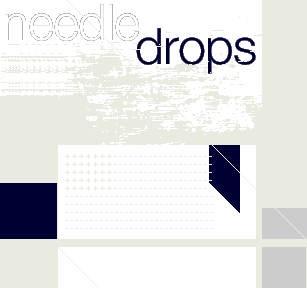


++ Contact Philip Sherburne ++
++ Recently ++
Tuesday, November 29, 2005 = The Stooges Unearthed (Again)
Tuesday, November 8, 2005 = Documenting Beulah And DCFC
Tuesday, November 1, 2005 = Out-Of-Control Rock 'N' Roll Is Alive And Well
Tuesday, October 25, 2005 = Just In Time For Halloween
Monday, October 3, 2005 = The Dandyesque Raunch Of Louis XI
Monday, August 15, 2005 = The Empire Blues
Tuesday, August 9, 2005 = David Howie's Sónar Diary
Monday, July 25, 2005 = Hot Sounds For Summertime
Monday, June 27, 2005 = Overcoming Writer's Block At Sónar 2005
Monday, June 4, 2005 = Cool New Sounds To Download Or Stream
++ Needle Drops Archives ++
View full list of Needle Drops articles...
|
|
 |
Friday, November 8, 2002
++ Twoism Examined
++ Hold that bid! If you're about to drop serious clams on that elusive copy of Boards of Canada's Twoism EP, you might want to read on.
Amongst collectors of IDM ("Intelligent Dance Music"), there are often considered to be two holy grails: Legofeet, the release that launched Skam records in 1990 or 1991 (the Skam Web site itself is unclear on the date), and Twoism, the first (confirmed) vinyl release from the Scottish duo — Michael Sandison and Marcus Eoin — whose 1998 album Music Has the Right to Children (Skam/Warp) established them as one of the brightest lights in leftfield electronica.
As is the case with holy grails, the very existence of both objects has been a matter of debate, especially in forums like the IDM list. Skam's second record, the first Gescom EP, didn't appear until 1994, and by 1996, when the label began to attract attention thanks to a critical mass of releases from Gescom and then-new artists like Jega, Bola, and Boards of Canada, Skam 01 had become mostly a matter of myth. It wasn't until the 1997 release of the Skampler label compilation, which excerpted the Legofeet EP, that the record's existence was confirmed. The original, however, remained exceptionally rare: when the occasional copy trickled onto eBay, it sold for hundreds of dollars.
++ BoC's Twoism was, if anything, even more mysterious. Skam founders Andy Maddocks and Rob Hall had always been known for keeping their movements obscure, but Boards of Canada were downright obfuscatory, and misinformation flowed freely. Sandison and Eoin lived on a rural commune outside Edinburgh. They were brothers. They'd been recording music since the mid-1980s, with cassette-only and limited vinyl releases galore. When Twoism turned up on an online discography, complete with cover images, IDM listmembers debated the veracity of the listing.
Recorded in 1995, limited to 100 copies and distributed by the band themselves, Twoism did in fact exist, and occasional auction sales only reinforced the object's covetable reputation: one copy reportedly sold for as high as 800 pounds sterling. (That's the equivalent of about $1,300 US!)
Finally, though, Twoism is receiving a wider commercial release. Warp Records is reissuing the nine-song record on both vinyl and CD. Available on Nov. 25, the record was offered up for pre-order this week on Warpmart, Warp's online store. A few holders of the original apparently tried to dump their stock before its value collapsed: one copy, offered for an opening bid of $180 on eBay, on October 29, remained unsold when the auction closed on November 5, with no bids registered. Another seller, only a few days earlier, did better: that person pocketed 125 pounds off the auction's sole bidder when the auction closed on October 31. One wonders if the bidder had heard the news when he placed his bid — and if not, whether he's kicking himself now. Warp's site announced Twoism preorders the following day. Ouch!
++ Readers are also no doubt wondering if the record is even worth a re-release. Boards of Canada have refined their sound, over the course of two LPs and a handful of singles, with such a singularity of focus that each successive release almost blots out those that come before. When my advance copy arrived and I tore open the mailer to discover a generically printed CD sitting forlorn in an unadorned jewel case, I couldn't help but feel a bit of a letdown, and I actually put off playing the thing for a week, avoiding the expected disappointment.
As an aside, I remember now that last time I wrote about a new Boards of Canada release — this year's phenomenal Geogaddi — it was also within the context of disappointment, or rather the risks of disappointment that come with a well-loved band. It's odd, because I don't consider myself an obsessive fan of Boards of Canada; perhaps these are simply the inevitable consequences when hype and mythmaking run unchecked.
As it turns out, the re-issue is well deserved. While not as lush, by and large, as Geogaddi, or even Music Has the Right to Children, it shares those records' palette of detuned analog chimes. While the beats aren't nearly as complex as on later records, the seeds are there in the form of clunky beatbox samples and crunchy snares reminiscent of boots on icy snow.
Fans of 1996's Hi-Scores EP (which, incidentally, is slated for reissue by Skam this month) will recognize "Seeya Later," included on both Twoism and the later EP. The interlude-like "Smokes Quantity," included on Music Has the Right to Children, also derives from Twoism — a detail that throws a minor wrench in theories about their musical progress, as it's clear that even in 1995 the group was well on the way to perfecting its signature sour psychedelia.
There's also a refreshing naïveté here: "Iced Cooly" has all the Boards of Canada trademarks, but there's something uncharactersitically jaunty, almost circus-like about it. But tracks like "Basefree" and "Twoism" are so steeped in the BoC style — the melted-tape quality, the nodding beats, the shuffle, the half-heard voices in the background — that it's almost uncanny.
++ Every song Sandison and Eoin have ever written, it seems, is a remix of themselves, and one wonders whether they're pursuing some asymptotal path to perfection, or running from influences that pursue them as doggedly as a can tied to their tails. Whatever the case, Twoism fills in their history, and complicates it. Geogaddi may be the most advanced record they've ever made. But if it's the perfection of an ideal type they're after, the Twoism re-issue — and the seven years of perspective that come with it — suggests that they just may have nailed it on the first try.
|
| |
|